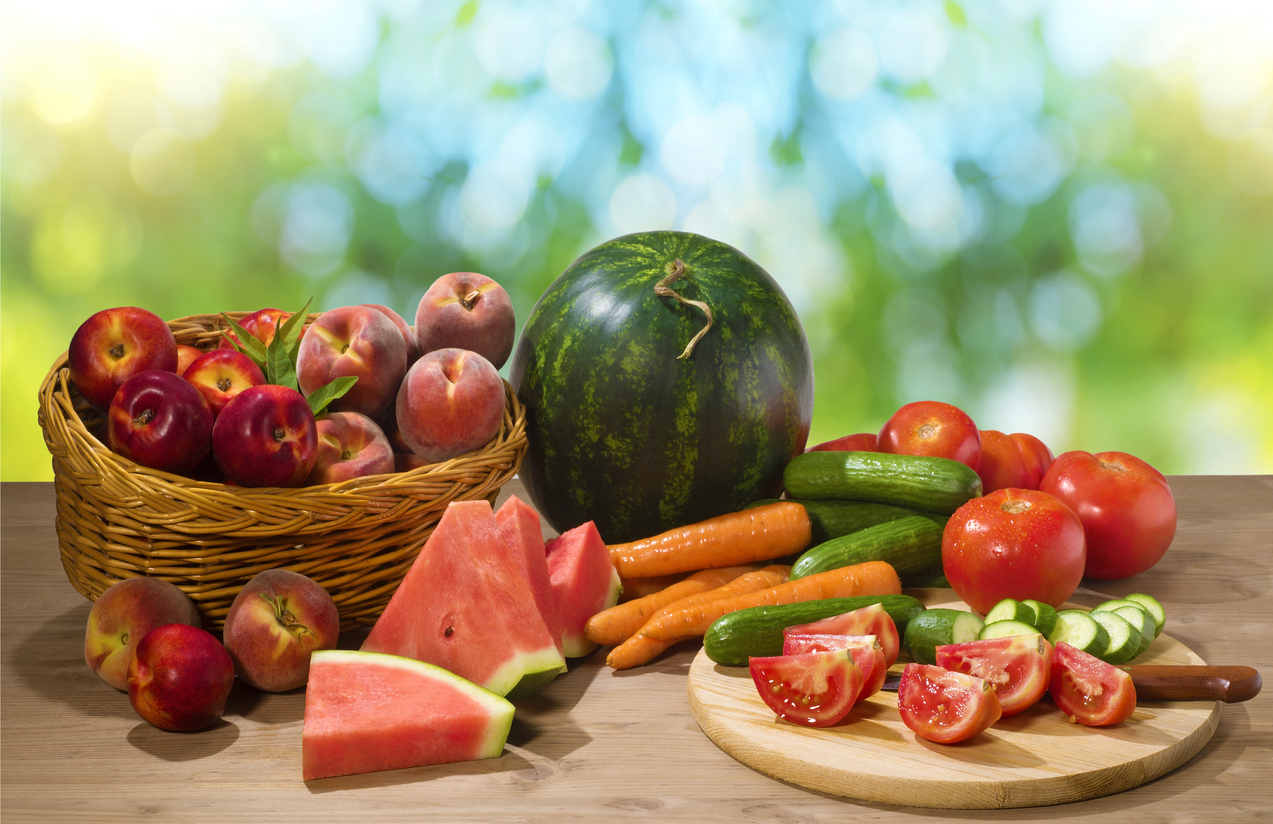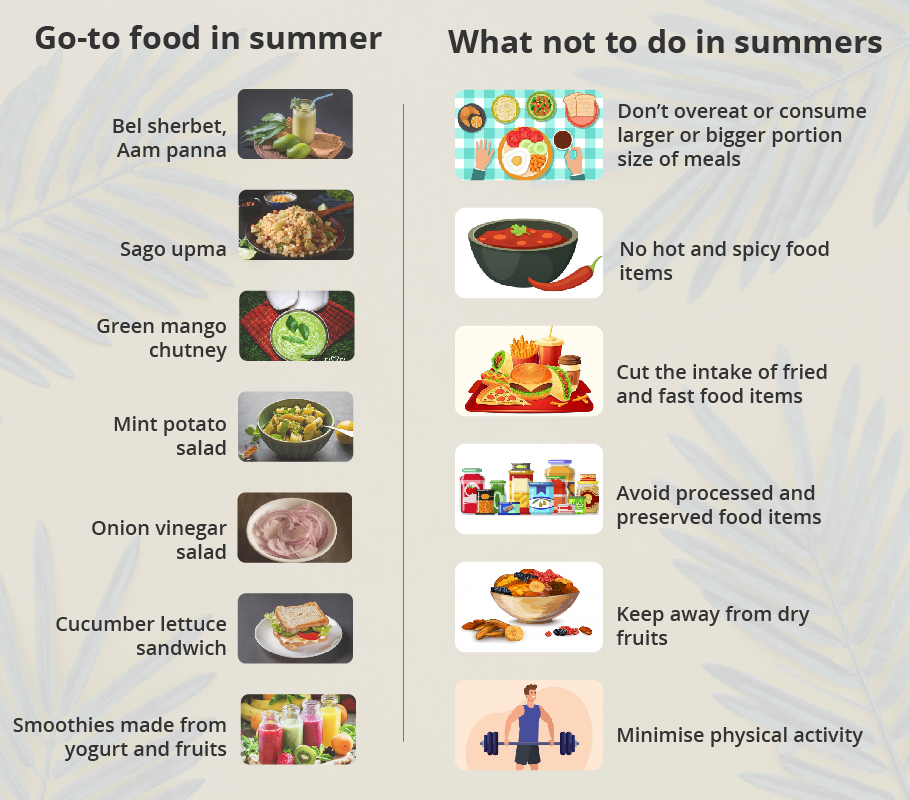
Go light on meals, eat seasonal food: Ways to beat summer blues

Eleven-year-old Sujata remembers having a glass of fruit juice with breakfast before going to school. Now she attends her online classes from home, but the glass of fruit juice remains the same in her breakfast menu. Similarly, nine-year-old Aakash used to enjoy a glass of aam panna prepared by his grandmother with lunch, once back from school. Aakash still reaches out for his granny-made glass of aam panna in the scorching summer months. So is the case of many children in the same age group who relish fruits, juices, buttermilk, smoothies and salads during summer months which have increased their intensity and duration.
The lesson: For summers one must make sure to include foods in daily diet that are light and easy on the stomach. These foods and drinks must be able to protect against dehydration, as well as maintain optimal levels of energy. The need of the season is to plan a summer diet for the day in advance with seasonal nutritional choices and preferences. Dr. Laxmaiah, scientist and head, Division of Community Studies at National Institute of Nutrition explains, “Consumption of balanced and healthy diet is very important in all the seasons to get nutrition security/nutrient sufficiency meet body requirements. However, the diet consumption pattern generally changed in different seasons like summer, rainy and winter seasons. Apart from the staple diet during summer, people generally eat more curd, butter milk, coconut water, mint/lemon water, juicy fruits like watermelon, cucumber and more of beverages.”

All these recommendations not only keep the body hydrated but also help it in absorbing sufficient water, regulating body temperature, eliminating harmful toxins, carrying essential nutrients and oxygen to the cells, and providing a moist environment for the body tissues and joints to function effectively.
Dr Neelanjana Singh, consultant nutritionist says, “Excessive heat can make you irritable, and cause insomnia and many more problems. In order to counter these problems it is best to imbibe foods that counter the high soaring temperatures we face in the summer months. Hydration is key to summer diets. Many seasonal fruits and vegetables have good amount of water content hence the right foods to be taken at this time. Hence stress on seasonal fruits and vegetables.” Singh has helped prepare the following list of foods beneficial in the summer months that can be incorporated in one’s daily menu:
- Bael sherbet, Aam panna
- Sago upma
- Green mango chutney
- Mint potato salad
- Onion vinegar salad
- Cucumber lettuce sandwich
- Smoothies made from yogurt and fruits
Not only dietary experts and nutritionist, even Ayurveda recommends to keep the body cool and avoid doshas to aggravate. Ayurvedic experts suggests consumption of alkaline and water-rich food in order to fight the heat in the body. Most of the fruits and vegetables have high water content, mostly in the range of 80 to 90 per cent.
The pious relationship of water and summer
Water in spite of being ignored due to sedentary lifestyle and work pressure, needs to be had at frequent intervals. When you’re dehydrated, you lose essential electrolytes such as potassium, calcium, and magnesium that are responsible for vital body functions. And that’s bad news for your health. Highlighting the ill-effects of not having enough water, dietician Supriya Maurya says, “Some of the first signs which clearly depicts that you are dehydrated include dull, dry skin, dry eyes, dark yellow urine, dizziness, headaches and cramping.”
Water plays an important role in our body’s various functioning like carrying several nutrients and waste products throughout the system and serves as a solvent for minerals, vitamins, amino acids and glucose. Water also acts as a lubricant and cushion around joints. It helps in body temperature regulation, an important process in summers.
In summers there is high loss of water from the body due to sweating and from our body’s internal activities like renal process, digestive processes, hormonal control etc.
Water requirements in relation to body weight varies in general way with the age. Dietician Supriya Maurya suggests, “For general recommendation it is advisable to drink eight-10 cups of water per day, but if we categorise it further, the numbers vary with age- 35ml/kg in adults, 50-60 ml/kg in children and 150 ml/kg in infants.”
Factors that determine water intake
Environment: If the weather is hot and humid, you will sweat more. This means that you need to consume higher levels of water.
Activity Levels: If you are doing any type of activity that makes you sweat, you need to consume additional water to replace the fluids that you lose.
Overall Health: If you have fever or are suffering from any illness, you may lose water from body. This can dehydrate you further due to the heat.
Pregnancy or Breastfeeding: If you are pregnant or are nursing, you will need to take extra fluids to keep your body hydrated.
Colour cooling effect
One very interesting fact is that the colour of food can also have a cooling effect on the body. Green, blue and purple are the colors that are the pick of the summer season. For this reason, fresh green lettuce and mint are hot favourites in the summer months. The colour of food can also help you determine its temperature. Green, blue, and purple fruits and vegetables tend to be more cooling than those that are red, orange, or yellow. In this way, a green apple will be more cooling than the red one.
Some of the other foods that help the body cool down are onions, green mango, cucumber and wood apple (bel). The high water content of these foods are loaded with minerals that are usually lost when we sweat. Try eating lots of vegetables such as cucumber, lettuce, cabbage and cauliflower. You can eat these foods raw in salad. Also, you can mix things and make a smoothie with yogurt. Yogurt is another food suited for consumption during the summer season.
Carbohydrate-rich foods are also beneficial for combating the summer heat. One should replenish the body every few hours with a good carbohydrate source such as fresh pita bread, idli or porridge made of sago. This strategy of frequent complex carbohydrate rich food helps to fight heart exhaustion.
Summer appetite problem
Now we know what to eat and how to eat in summers, but we all experience a low appetite during hot season. Before we discuss how to cope up with the situation, let’s understand the reason. During hot weather lesser energy is needed to maintain our body temperature hence during summers the energy consumption is less so need of calories is also less. According to doctors, all of the body’s functions, including digestion, create heat within the body.
Then how to solve the problem? Dietician Saumya Maurya suggests a ‘not to do list for summers’:
- Don’t overeat or consume larger or bigger portion size of the meals.
- No hot and spicy food items.
- Cut the intake of fried and fast food items.
- Avoid processed and preserved food items.
- Keep away from dry fruits.
- Minimise physical activity.
So, a special care about your diet during summers will help you stay fit, active and gives you required energy for your daily activities and proper functioning of your body organs. Lastly, listen to your body always and act accordingly.
(India Science Wire)

